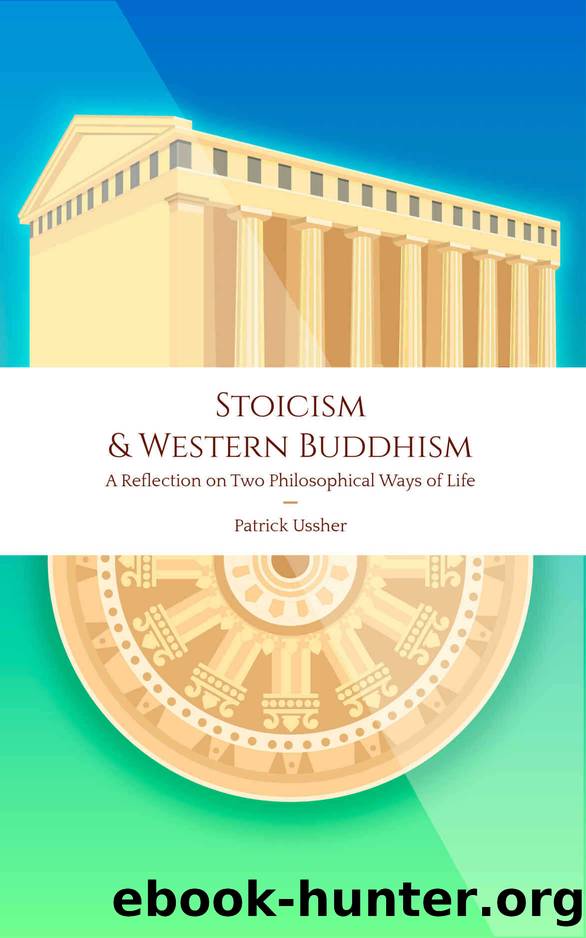Stoicism & Western Buddhism: A Reflection on Two Philosophical Ways of Life by Patrick Ussher

Author:Patrick Ussher [Ussher, Patrick]
Language: eng
Format: epub
Publisher: Patrick Ussher
Published: 2018-02-21T00:00:00+00:00
Chapter Three
Cultivating Compassion
âLike the vine that produces its grapes, seeking nothing more once it has given forth its fruitâ¦.so the good man having done one deed well, does not shout it about, but turns to the next good deed, just like the vine turns to bear forth its fruit in due season.â
Marcus Aurelius, Meditations, 5.6.
âEven when I do things for the sake of others
No sense of amazement or conceit arises
It is just like feeding myself
I hope for nothing in return.â
Shantideva, The Way of the Bodhisattva, 8: 116.[162]
Stoicism and Buddhism inspire us to live in a kind of âaltruistic flowâ and suggest that the highest forms of happiness that anyone can find come, paradoxically, when we âforgetâ ourselves and focus on others.
However, both the Buddha and Zeno, the founder of Stoicism, also said things which seem to strike a different note:
âHaving traversed all quarters with the mind, one finds no one anywhere dearer than oneselfâ¦â [163] - Buddha
ââ¦the first and dearest object to every living being is its own existence and its consciousness of that existence.â [164] - Zeno
Both of these quotations emphasise the importance of care for the self. How, then, are selfless acts so very central to the life of goodness in both Stoicism and Buddhism?
The Relationship Between Concern for Self and Compassion for Others
There are several ways which both Buddhism and Stoicism essentially share which can show us why a concern for self, when understood correctly, can naturally lead to compassion for others.
Firstly, that one considers oneself dearest of all is not, of course, a psychological basis which only carries importance for oneself. For all other human beings also feel the same way about themselves. Let us complete the quotation of the Buddha above: âEach person holds himself most dear; hence one who loves himself should not harm others.â Likewise, Cicero tells us, when describing Stoicism, that the ââ¦mere fact that someone is a man makes it incumbent on another man not to regard him as alien.â[165] If we truly understand our own need for self-care, we will not harm others, for everyone is in the same, human situation. There is a shared principle of humanity at play.
Secondly, there is the need to find what is the best way to live given what kind of nature we, as human beings, have. For the Stoics, we are social beings and, as a result, virtue is inherently social: it becomes most âactiveâ when we act out of concern for others. In this way, by following virtue, we fulfil our social nature. Epictetus encapsulates this idea as follows:
ââ¦Zeus has prepared the nature of the rational animal such that he can achieve none of his own proper goods unless he also offers something to the common interest.â[166]
We are âmadeâ, biologically speaking, by Nature (here referred to by Epictetus as âZeusâ who, as a divine principle which permeated all living creatures, was synonymous with âNatureâ in Stoicism), to find what is best for us when we engage with others. In Stoicism, the âselfâ is an inherently social self, not an isolated entity.
Download
This site does not store any files on its server. We only index and link to content provided by other sites. Please contact the content providers to delete copyright contents if any and email us, we'll remove relevant links or contents immediately.
The remains of the day by Kazuo Ishiguro(8998)
Tools of Titans by Timothy Ferriss(8393)
Giovanni's Room by James Baldwin(7346)
The Black Swan by Nassim Nicholas Taleb(7129)
Inner Engineering: A Yogi's Guide to Joy by Sadhguru(6793)
The Way of Zen by Alan W. Watts(6614)
The Power of Now: A Guide to Spiritual Enlightenment by Eckhart Tolle(5781)
Asking the Right Questions: A Guide to Critical Thinking by M. Neil Browne & Stuart M. Keeley(5775)
The Six Wives Of Henry VIII (WOMEN IN HISTORY) by Fraser Antonia(5514)
Astrophysics for People in a Hurry by Neil DeGrasse Tyson(5189)
Housekeeping by Marilynne Robinson(4446)
12 Rules for Life by Jordan B. Peterson(4303)
Ikigai by Héctor García & Francesc Miralles(4274)
Double Down (Diary of a Wimpy Kid Book 11) by Jeff Kinney(4268)
The Ethical Slut by Janet W. Hardy(4251)
Skin in the Game by Nassim Nicholas Taleb(4248)
The Art of Happiness by The Dalai Lama(4130)
Skin in the Game: Hidden Asymmetries in Daily Life by Nassim Nicholas Taleb(4004)
Walking by Henry David Thoreau(3961)
